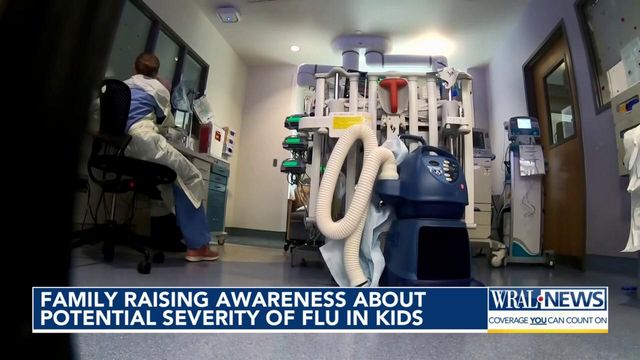Child's flu death a warning: Take these symptoms seriously
A Wilson girl is one of just a handful of young people to die of the flu in North Carolina this winter. Through Dec. 14, 14 flu deaths were reported in the state; 10 of them were in people older than 65.
The family of Jasmyne Kite said she had been sick for days and was being cared for at UNC Hospitals. Unfortunately, the flu virus infected her heart – a rare condition called influenza myocarditis. She had a cardiac arrest and died.
"Many of us do not take the flu seriously and do not understand the severity of the virus. It is not just the flu," an aunt wrote in asking for help with medical bills and funeral costs on GoFundMe.
Dr. Lori Langdon, a pediatrician and chair of pediatrics at Campbell University, said Jasmyne's family was right to seek hospital care, and she offered advice for other parents for when to make that call.
"The height of the fever or number doesn’t scare us. It scares us how they are handling the fever," she said.
When a child is sick, it is important to watch for signs of dehydration.
"Really push fluids," Langdon said. "I don't want you to be concerned if they are not eating solid foods. I need for you to push liquids."
A child who is not drinking or urinating, should be taken to an emergency department, where they can be treated with intravenous fluids.
Langdon, who offers advice on YouTube, pointed out that other respiratory infections are swirling this winter as well.
“Our top reason for seeking a higher level of care is if there is difficulty breathing," she said.
"We are getting slammed with RSV right now."
Anytime a child is struggling to breathe, a visit to the hospital or urgent care is in order.
"If their belly muscles are working in and out to help them breathe, shoulders bobbing, head bobbing – all are bad signs of respiratory distress and they should be seen even if it's the weekend, even if it's the middle of the night," Langdon said.
The Mayo Clinic suggests the following are symptoms that should be checked by a doctor:
- Fever of 100.4 degrees in newborns up to 12 weeks.
- Rising fever or fever lasting more than two days in a child of any age
- Trouble with breathing or wheezing
- Ear pain
- Fussiness or drowsiness that isn't typical
- No interest in eating
Doctors and U.S. Centers for Disease Control and Prevention recommends the annual flu vaccine for everyone 6 months and older.
It provides two important benefits:
- It reduces the chance of severe illness for those who catch the flu. According to studies cited by the CDC, vaccinated patients had a 26% lower risk of intensive care unit admission and a 31% lower risk of death from the flu compared to unvaccinated individuals.
- The more people vaccinated, the less likely the flu is to spread.
The CDC's data, through Dec. 2, 2023, shows about 41 percent of those eligible had been vaccinated, the lowest rate of vaccine uptake in five years.
Jasmyne Kite's father says his family wants to create "more awareness about the flu and the damaging effects."













